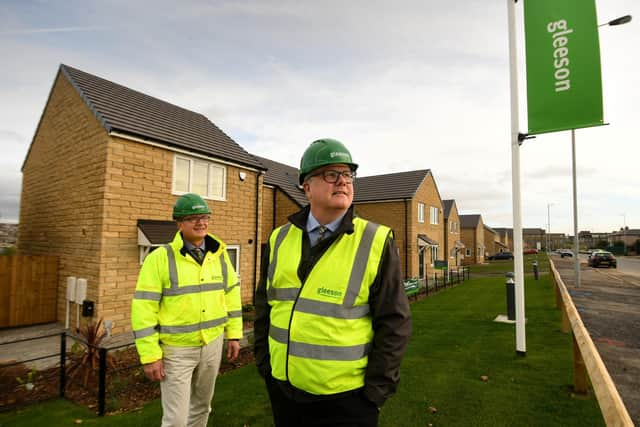Sheffield's Gleeson Homes calls on Government to support low income house buyers as Help to Buy applications close
Speaking at Gleeson Homes’s Northbeck Grange development in Bradford, CEO James Thomson outlined the ways that ministers could help low-cost housebuilders such as his firm. He suggested that a new support scheme should be devised as applications closed for the long-running Help to Buy on Monday, while calling for greater flexibility to facilitate building on brownfield sites and the need to comply with national space standards.
Sheffield-based Gleeson Homes’s customers are typically young, first-time buyers with an average income of £24,000 and it is the fastest growing listed housebuilder on the London Stock Exchange, says the company.
Advertisement
Hide AdAdvertisement
Hide AdMr Thomson said: “I've always been an advocate that Help to Buy has been helping many people who actually don't need that assistance. I think what the Government must do is ensure it doesn't lose focus on those customers on the lowest incomes, helping them get into home-ownership. And that's ensuring that they've got access to some of those cheapest products. So maybe, for instance, I know they've been looking at a potential mortgage indemnity scheme, and that would help customers access some of those cheapest mortgages.”


Another issue for Mr Thomson is biodiversity policies affecting brownfield sites – previously developed land. Northbeck Grange is one such location, a former Grattan site where Gleeson is building 167 homes until 2025. "I think Government also needs to look at the unintended consequences of some of the policy changes that it has been bringing through, such as biodiversity net gain,” said Mr Thomson, referring to a policy which advocates that natural environments be left in better conditions than before. He said: “Some of that adversely impacts - believe it or not - brownfield sites. A brownfield site that's been left fallow for 10 years may have a much higher degree of biodiversity and the greenfield site - a farmer's field that has been ploughed for the last 50 years. And that can add lots of cost on to a site, which is already quite costly to remedy, given the brownfield nature of it.”
Mr Thomson also said more flexibility is needed on national space standards – which are not regulations but provide a framework for planners. "These are well-designed houses which provide a good sense of space yet the Government policies around nationally described space standards, in many cases, would require us to be building these homes 10 to 30 per cent bigger. It's not actually what our customers necessarily want or need. And actually, all that does is it makes the homes 10 to 30 per cent more expensive. If what we're trying to do is deliver genuinely affordable homes to get young people out of the rent trap, there needs to be, I think, a greater degree of flexibility around those space standards that are coming through.”
A Government spokesperson said: “Increasing the number of affordable homes is central to our levelling up mission and we are making changes to the planning system to speed up this process. More than 38,000 affordable homes have been delivered in Yorkshire and Humber since 2010. We are continuing to help first-time buyers onto the property ladder with our Shared Ownership and First Homes schemes, as well as cuts to stamp duty."